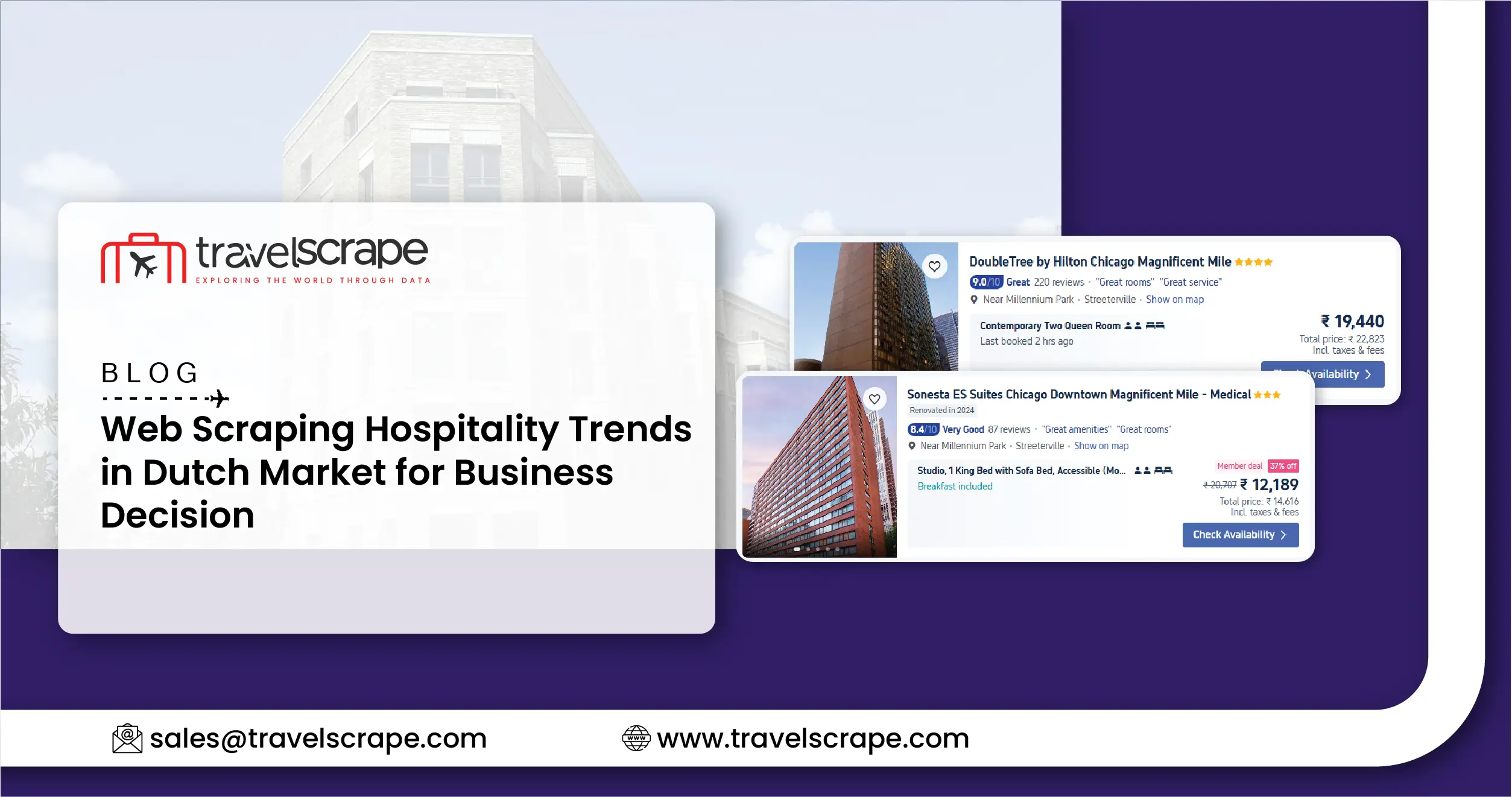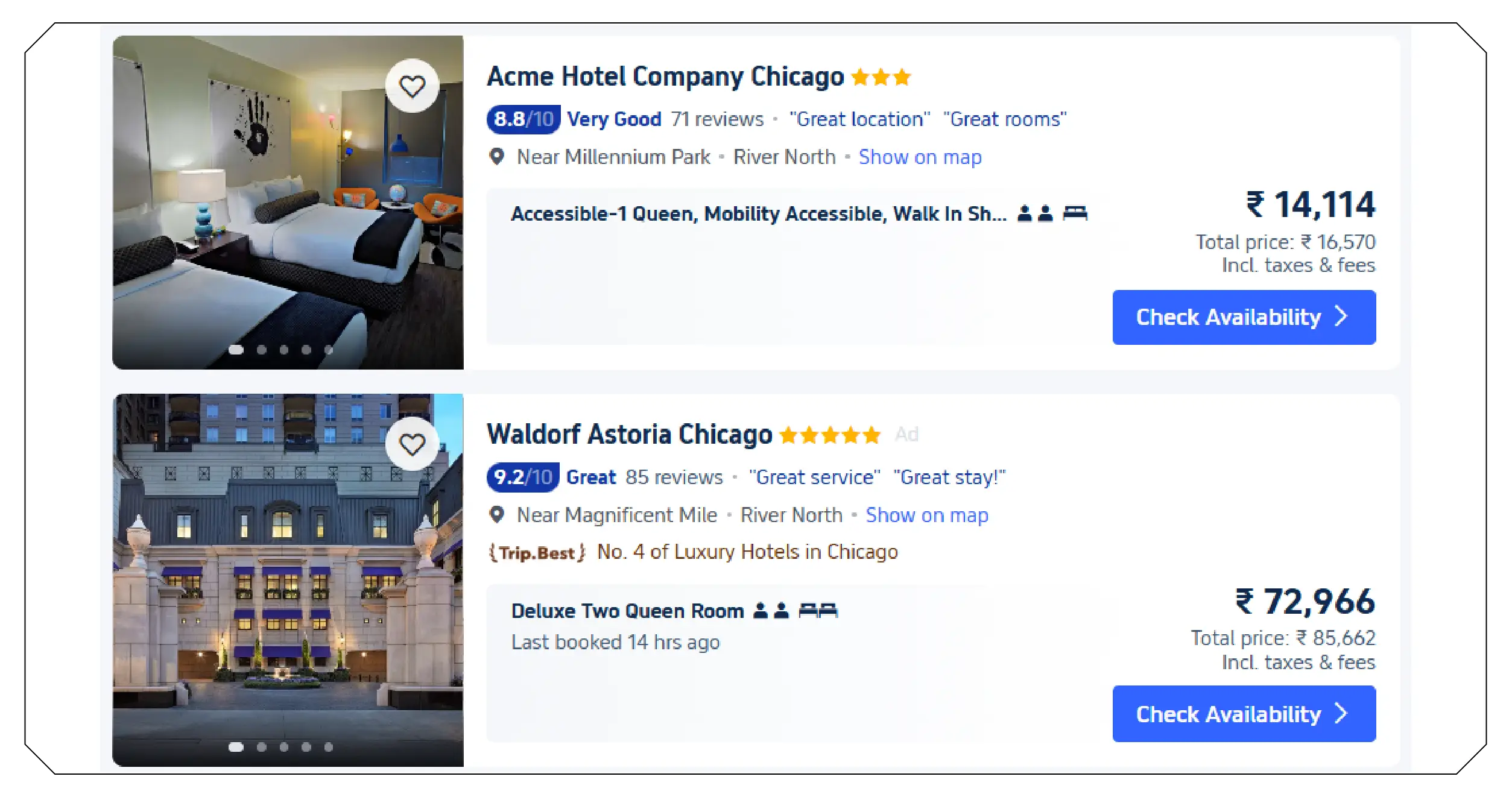How Can Web Scraping Hospitality Trends in Dutch Market Helps in Making Business Decisions?

Introduction
In today’s dynamic tourism landscape, hospitality businesses in the Netherlands are constantly seeking insights to understand market trends and customer preferences. Travel platforms and hotels are leveraging advanced data collection methods to gain a competitive edge, particularly through Web Scraping Hospitality Trends in Dutch Market. This approach allows them to track pricing patterns, occupancy trends, and guest behavior in near real-time, which is crucial for shaping strategic decisions in the hospitality sector.
Moreover, these platforms frequently utilize Hotel Data Scraping Services to aggregate comprehensive information from multiple sources, including hotel booking sites, review platforms, and tourism databases. Such data helps companies benchmark their services, understand customer expectations, and optimize pricing strategies. By integrating these scraping methodologies, Dutch hospitality businesses are redefining how market intelligence is gathered and utilized.
Another critical tool in this process is the ability to Scrape Hospitality Data to Track Market Trends in Dutch. By analyzing trends across cities like Amsterdam, Rotterdam, and Utrecht, businesses can identify occupancy patterns, pricing fluctuations, and customer preferences. Combining local and broader Dutch market data allows platforms to adopt predictive analytics models, anticipate market demand, and adjust offerings proactively.
Understanding Hospitality Data in the Netherlands

Hotel and vacation rental listings in the Netherlands provide rich insights into tourism patterns, including property types, nightly rates, availability, amenities, and guest reviews. Platforms collect this data through automated scraping scripts that parse web content, access APIs where available, and structure the data into actionable datasets.
One of the most valuable datasets is the Hotel Guest Review Dataset. Guest reviews offer qualitative insights into traveler satisfaction, highlighting recurring themes such as cleanliness, service quality, and location convenience. Analyzing these reviews allows businesses to identify patterns in customer expectations, which can inform recommendations and pricing strategies.
For example, high-rated neighborhoods can be targeted for investment, while monitoring review sentiment over time can reveal emerging trends, such as the growing demand for eco-friendly accommodations or work-friendly spaces suitable for business travelers.
Technical Process of Scraping Hospitality Data
The process of extracting hospitality data involves multiple steps:
- Data Acquisition: Platforms deploy automated scripts that request listing pages, extract relevant HTML elements, and retrieve structured information such as property type, pricing, and occupancy.
- Data Cleaning: Raw data often contains inconsistencies, duplicates, and missing values. Cleaning ensures that datasets are accurate and ready for analysis.
- Data Structuring: Extracted data is organized into databases, often segmented by location, property type, or seasonal trends.
- Analysis and Insights: Once structured, data is analyzed using statistical models, machine learning algorithms, and visualization tools to generate actionable insights.
Advanced platforms also implement measures to mimic human browsing behavior and avoid IP blocks, ensuring continuous and reliable data collection.
Real-Time Market Insights
One of the most significant advantages of data scraping is enabling Real-time market monitoring for Dutch hospitality sector. By monitoring listings and hotel data in real-time, businesses can detect shifts in availability, sudden price surges, or changes in guest sentiment.
This capability allows hotels, property managers, and investors to respond proactively. For example, during major events or holiday seasons, real-time insights help adjust room rates, manage bookings efficiently, and maximize revenue. Platforms can also forecast occupancy trends and optimize pricing strategies, ensuring competitiveness in the fast-paced hospitality market.
Competitive Benchmarking
Another strategic application of data scraping is Scraping Dutch hospitality data for competitive benchmarking. By analyzing competitor pricing, occupancy rates, and guest ratings, businesses can identify market gaps or areas for improvement.
Competitive benchmarking provides actionable insights such as:
- Average nightly rates across property types
- Seasonal demand fluctuations
- Popular neighborhoods or districts for travelers
- Guest expectations and feedback trends
This information empowers hospitality managers to make data-driven decisions, improve offerings, and enhance their market positioning.
Price Intelligence Through Data Scraping
Hotel Price Data Scraping is a key component of hospitality analytics. Tracking historical and real-time pricing allows platforms to identify trends and provide actionable recommendations for clients.
If a particular area shows high price volatility, property owners can implement dynamic pricing strategies to maximize occupancy and revenue. Additionally, integrating scraped data with predictive models helps forecast peak periods and enables smarter inventory management. This approach not only benefits hotels but also guides promotional campaigns and targeted marketing initiatives.
Extracting Comprehensive Market Insights
To gain a holistic view, platforms Extract Dutch Hospitality Data for Market Trend Analysis and combine it with complementary datasets. This integrated view captures seasonal demand, property popularity, pricing sensitivity, and guest preferences.
By analyzing both hotel and vacation rental data, businesses can evaluate the overall market landscape. They can determine whether short-term rentals are competing with or complementing traditional hotels, helping guide investment decisions, urban planning, and strategic tourism initiatives.
Enhancing Revenue Management Strategies
Hotel Rate Data Scraping empowers hotels and platforms to optimize revenue management. By continuously monitoring competitor rates and booking trends, property managers can adjust pricing in near real-time.
Rate data, when combined with guest review metrics, creates a comprehensive value assessment. High-rated properties can command premium pricing, while lower-rated accommodations may need discounts to maintain competitiveness. Combining quantitative and qualitative analysis enables more informed revenue strategies.
Challenges in Scraping Hospitality Data
Despite its advantages, hospitality data scraping faces several challenges:
- Data Privacy and Compliance: Dutch laws and GDPR regulations require strict adherence to data protection standards.
- Anti-Scraping Measures: Booking platforms often use CAPTCHAs, dynamic content loading, and rate-limiting. Businesses must implement ethical bypass methods.
- Data Quality Issues: Incomplete or inconsistent listings can affect analysis accuracy, requiring continuous cleaning and validation.
With proper techniques, these challenges can be managed, ensuring reliable and actionable market intelligence.
Visualization and Analytics
Collected data is transformed into actionable insights through visualization and analytics tools. Dashboards display trends in occupancy, pricing, and guest satisfaction. Heatmaps highlight high-demand locations, while trend graphs show price fluctuations over time.
AI models can also predict future demand, guest preferences, and optimal pricing strategies. Predictive analytics enables stakeholders to take proactive decisions rather than relying solely on historical data.
Integration with Other Market Data
Platforms often integrate scraped hospitality data with other datasets such as hotel bookings, tourism statistics, and competitor performance metrics. Multi-source integration validates trends, identifies anomalies, and increases accuracy.
For example, correlating occupancy data with booking statistics provides a complete view of total accommodation demand. Similarly, integrating guest reviews from multiple platforms enables sentiment analysis that captures nuanced customer preferences.
Future of Dutch Hospitality Analytics

The future of hospitality analytics lies in advanced scraping, real-time insights, and predictive intelligence. By continuously Web Scraping Netherlands Hospitality Trends in Dutch Market, businesses maintain a competitive edge.
Real-Time Hospitality Data Extract in Netherlands Dutch Market ensures stakeholders receive timely insights for immediate action. Automated systems detect sudden shifts in demand, enabling rapid adjustments to pricing, marketing, and service strategies.
Finally, Hotel Booking Data Scraping provides full visibility into bookings, occupancy, and revenue performance. Combining this information with guest feedback and competitor data delivers unparalleled market intelligence that drives strategic growth and operational efficiency.
How Travel Scrape Can Help You
- Competitive Pricing Insights: Collects real-time pricing from hotels and booking platforms to optimize rates.
- Market Trend Analysis: Provides occupancy trends, seasonal patterns, and performance metrics for informed decisions.
- Guest Review Monitoring: Highlights satisfaction levels, common complaints, and areas for improvement.
- Benchmarking Against Competitors: Compares offerings with competitors and identifies gaps to enhance services.
- Revenue Optimization: Combines pricing, occupancy, and review data to maximize revenue through dynamic strategies.
Conclusion
Web scraping enables Dutch hospitality businesses to extract, clean, structure, and analyze data for actionable market insights. By leveraging advanced scraping tools, hotels, travel platforms, and investors can make informed decisions, optimize revenue, and maintain competitiveness. Integrating datasets from guest reviews, competitor rates, and broader market trends provides a comprehensive view for strategic planning, revenue optimization, and competitive benchmarking. In the evolving hospitality ecosystem of the Netherlands, data-driven decision-making is essential for sustained growth and operational efficiency.
Ready to elevate your travel business with cutting-edge data insights? Scrape Aggregated Flight Fares to identify competitive rates and optimize your revenue strategies efficiently. Discover emerging opportunities with tools to Extract Travel Website Data, leveraging comprehensive data to forecast market shifts and enhance your service offerings. Real-Time Travel App Data Scraping Services helps stay ahead of competitors, gaining instant insights into bookings, promotions, and customer behavior across multiple platforms. Get in touch with Travel Scrape today to explore how our end-to-end data solutions can uncover new revenue streams, enhance your offeri ngs, and strengthen your competitive edge in the travel market.